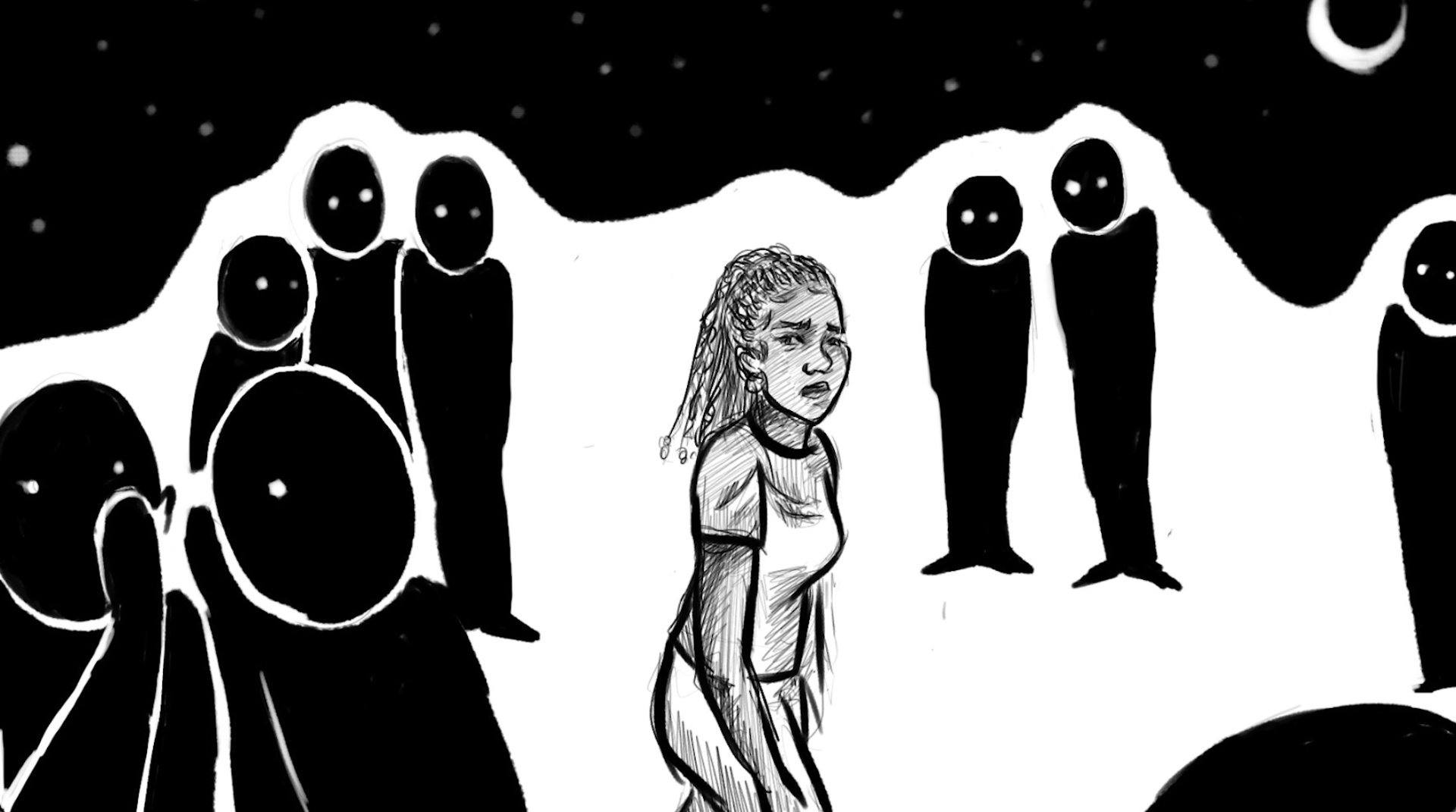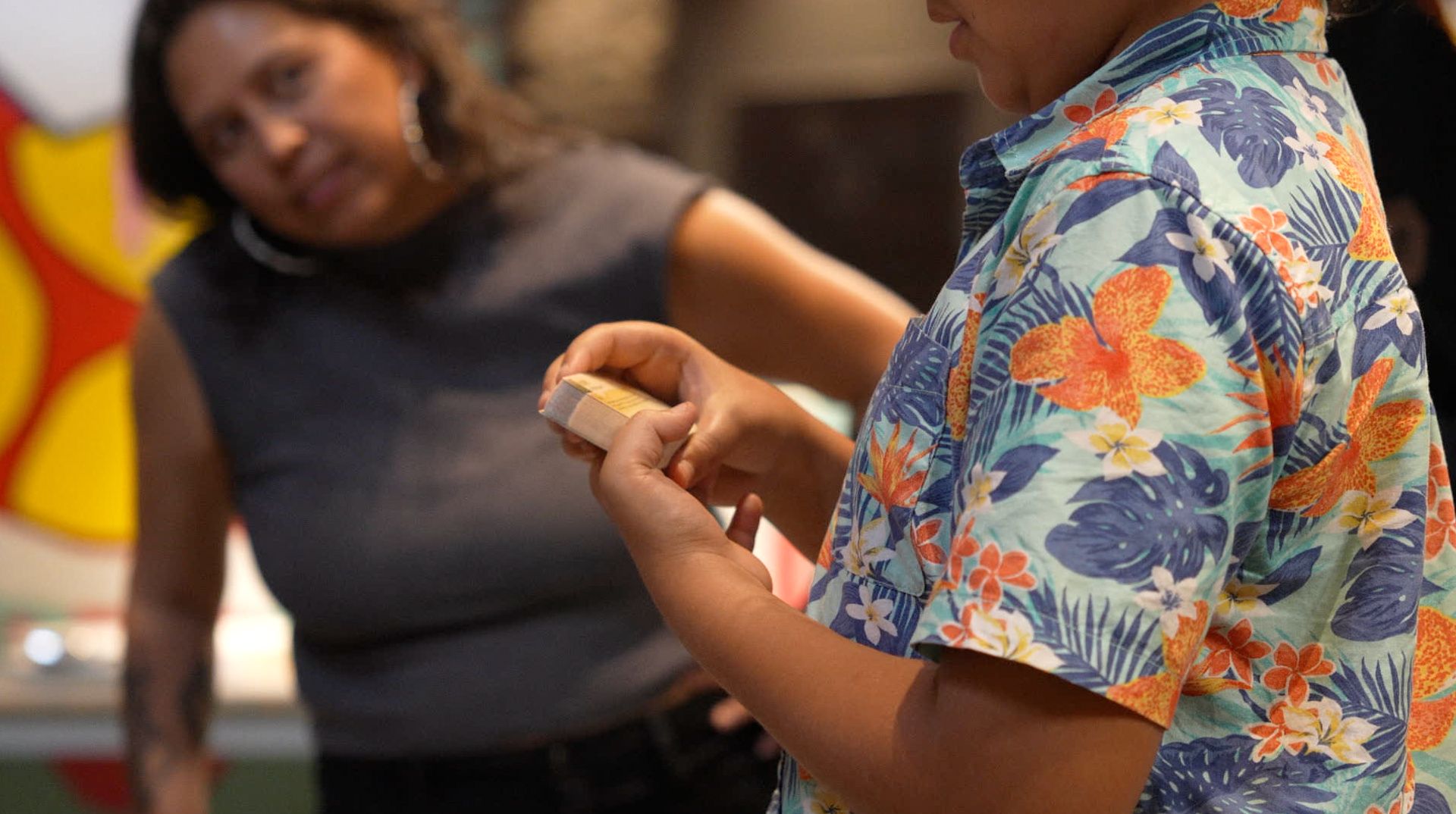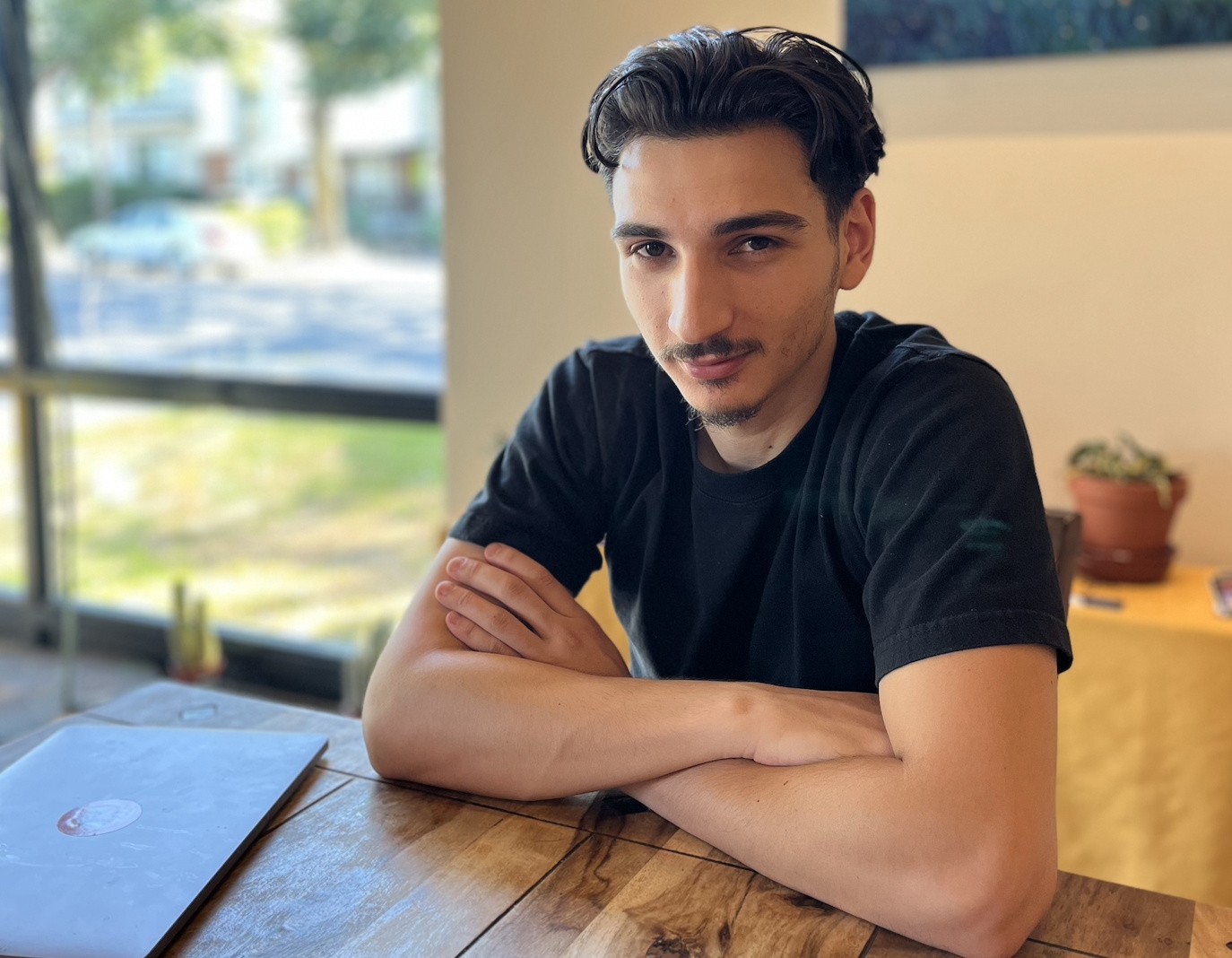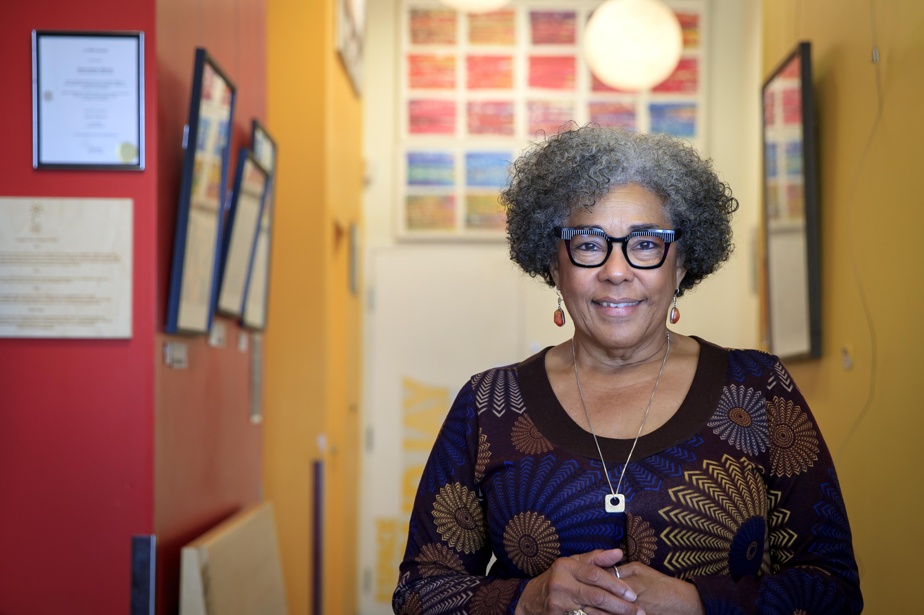Norman Ajari, doctor of philosophy and lecturer in French-speaking Black studies at the University of Edinburgh in Scotland, is visiting Quebec for the second time. We met him at the La Converse office, where he spoke frankly about decolonial philosophy and anti-Black racism.
Standing two meters tall, wearing a simple suit jacket and dressed in street shoes, Norman Ajari seemed reserved at first glance. But as soon as he started talking about philosophy, he revealed his humour and a great natural ease. A small pink matcha cup in hand, the intellectual makes the most complex subjects light. Serious and fun, he succeeds in demystifying philosophy and captivating his audience.
“I'm going to try to speak in ordinary language, as they say,” the philosopher begins with a laugh.
La Converse: You are a specialist in decolonization and Afro-decolonization. Can you explain to us the particularities of these liberation movements and how they differ?
Decolonization is all the businesses, all the political movements, all the activism that has emerged to get rid of the colonizers. If we talk about the century, decolonization was the movement of reconquest, political and economic autonomy, the sovereignty of territories in Africa and large portions of Asia conquered by European powers. It is a long process, not yet completely completed, and sometimes even particularly incomplete.
Decolonization increasingly has an intellectual dimension, a dimension where it is possible to develop your own thinking yourself. Because thought has often been the exclusive domain of the white world. The ideas of Black populations, Asian populations or even Indigenous populations have been discredited and have been considered inferior, as devoid of universal value and intrinsic quality.
Decolonization can therefore have several dimensions: economic, political, but it can also be a certain intellectual liberation.
How is it different from Afro-decolonization?
An Afro-decolonial philosophy seeks to achieve this decolonization enterprise in the service of — and in an understanding — of the Black experience.
Popular philosophy was born out of wonder, of astonishment. From there, we started asking philosophical questions like, “What is beauty? What is kindness? ” That's what we get in Plato's dialogues. In short, it's a good old philosophy.
But the problem is that, for the Black experience — as explained by the Cameroonian philosopher Fabien Eboussi Boulaga — philosophy does not start with wonder or astonishment. It starts with the stupor caused by total defeat. A shock in the face of colonial dehumanization.
Even today, to be Black means to be a descendant of slaves or colonized people. All Blacks are descendants of populations whose humanity has been denied by all Western sciences: philosophy, literature, law, economics, biology.
In short, all Western sciences have come together — from the Age of Enlightenment to the beginning of the 20th century — to say that lacks are inferior. So, we live in a world that is historically oriented according to the denial of lack peoples. Of course, ck philosophy cannot start from the same point.
So, even if it is painful, the Afro-decolonial philosophy aims to reflect on all the consequences of this violence that has been suffered by Blacks, to try to reclaim this humanity, to remanufacture it and, above all, to try to produce some form of reparation.
Today, Quebec, like France, refuses to recognize the existence of systemic racism. Why do you think?
I think that it is simply the French influence that plays a big role here. This is not so much explicit racism, but rather a legacy of French political philosophy, especially that of Rousseau, who advocates an abstract vision of the citizen: an individual who judges laws solely according to the general interest, without taking into account his class, gender, race or religion.
Of course, this universalist model from the Enlightenment is philosophically, speculatively very beautiful. But in practice, they are simply laws that protect the powerful by telling the poor and oppressed not to consider their interests, but rather those of society as a whole.
Francophones, especially in Quebec, remain seduced by the elegance of this philosophical tradition. However, after centuries of workers', Marxist or anti-racist struggles, these ideas now seem outdated and ineffective. It is a slavish imitation of France, a desire to replicate or even surpass its heritage. This results in a system that, under refined and subtle appearances, perpetuates social inequalities — it is the epitome of all the worst that France can give in the world.
Is there a big difference in the perception of the concept of “race” in the French-speaking world and the English-speaking world?
There are indeed different diplomatic sensitivities. On the English-speaking side, for example, to highlight your condition as a black woman, to make it a self-story, is great.
For Francophones, we must be in a universalist discourse, try to show that we are part of a diversity, but a little more acceptable. So, if you're in a kind of diplomacy, you can't speak the same language to them. There are different political sensitivities, and we are obliged, especially if we have to negotiate money, to speak a different language and to adapt to different political imaginations in order to legitimize ourselves.
In the Quebec context, it is important not to make speeches that crack national unity, especially if it is to negotiate money.
Also at the university level, all French-speaking countries in the global North have universities where Black studies are absolutely not developed. This is obviously the opposite of what happens in the United States or Great Britain, where I teach myself, or in English-speaking Canada. It's a bit heartbreaking, let's put it that way. There is no desire to develop Black thinking. Black people are still assigned to sports, to athletic performance — stereotypes that have a strong connection to the history of slavery.
But to say that there is a real difference between the English and French contexts in North America, or in Europe? I don't believe it for a second.
There is this popular idea that Francophones are more racist than Anglophones. Do you agree?
No and they're just throwing the ball back at each other. Francophones point to American prisons and say, “Look, they are the real racists.” Anglophones respond: “No, look at the Francophones instead, they don't recognize systemic racism.”
In reality, they are racist in different ways, that's all. In Quebec, as in the United States, the stereotypes about Blacks are the same. “Blacks who love chicken, who have big lips, who are lazy...” These are the same clichés because this continent was colonized by three major slave powers: the Spanish, the French and the British. These nations all participated in the transatlantic slave trade, and their heritage of Negrophobia is the same. There is no place where the image of Black people is better than elsewhere. Stereotypes about Black bodies, the sexualization of Black women, or the fantasy around the Black man's penis — all these cross cultures and languages.
Can we hope to one day get rid of the stereotypes and structures that perpetuate Negrophobia?
Unfortunately, what keeps Negrophobia in the world is the overexploitation and violence exerted on Africa. We live in a world where the economic and political situation in large parts of the African continent is still seen as evidence of the inferiority of Black people.
You can always use this argument when a Black person wants to put themselves forward: “But you Black people are always inferior. Look at the situation in Africa: you are not able to manage yourself, etc.”
Thus, the primary objective of colonialism, extractivism in Africa and the coups d'État is to secure the exploitation of resources by multinationals, of course. But they also have a secondary function, conscious or not: maintaining and justifying the inferiorization and exploitation of Black people, including here.
But obviously, that should not be used as an excuse not to fight this more ordinary racism here. Because they're just plain human rights.
How do you think we can combat this anti-Black racism?
I strongly believe that collective organization is key. There are a lot of individuals who suffer in their corner, who don't quite know how to fight systemic racism because it's sometimes preempted by the government.
While government initiatives like programs to support Black entrepreneurs are good, they are not enough. The problem is that these are measures that tend to balkanize people a little bit: we bring these Black people together for training, but they each have their own objective, their own project. These measures sometimes tend to individualize problems by focusing on personal success, rather than collective struggle.
What is fundamental is not even to get involved politically, to create a political organization like the Black Panthers. It is essential to pass on the history of anti-racist struggles to younger generations: to share the heritage of Black thought, of what our ancestors did — how they reflected on society, on the obstacles Black people faced in society. Once transmission begins, they must be encouraged to organize around projects that they are passionate about. It is by taking ownership of their history and by connecting to past struggles that young people will be effective in transforming society.
Do you have any advice for a young Black person or a young person of colour who wants to become a philosopher?
Of course, read. Read Black authors, be curious. Do not hesitate to do as the Diggers of music, to do the underground, to look for Black thinkers from your countries of origin. Look at the history of neighbouring countries, the history of the diaspora, and let yourself go in there.
A large part of Black activism is part of conscience. It's no longer too fashionable to be Woke, but it's knowledge. To evolve in a world marked by our knowledge of Black history is to enter into a process of self-transformation. It's not just the project of getting rich that can be interesting — acquiring wisdom, especially Black wisdom, is a real project for the future.
Norman Ajari's reading recommendations:
• Pompey Valentin Vastey:
The colonial system unveiled
• Frantz Fanon:
Black skin, white masks
Year V of the Algerian Revolution
• The books of Marcus Garvey
Norman Ajari's books:
- Dignity or Death: Race Ethics and Politics
- Where does racism start? : Disagreements and arguments (co-written with Marylin Maeso and Martin Legros)
- The Afro-Decolonial Manifesto








.jpg)

